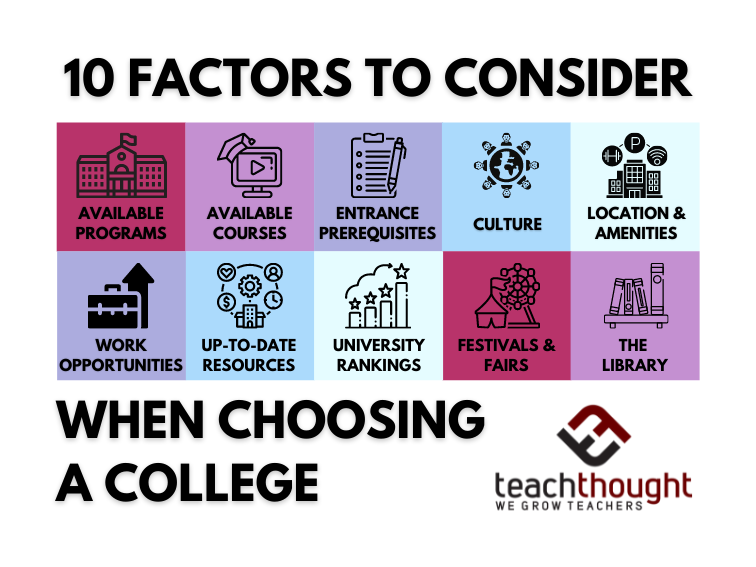
What Factors Should You Consider When Choosing A College?
contributed by Alex Hepgurn
Choosing a college for study can be a taxing experience and which criteria you should consider and value isn’t always clear.
And it’s also not always black and white. There often is no right or wrong choice; you can make all the informed decisions in the world and not find out until years later what you didn’t consider. However, it is prudent to learn and do everything in your ability to prevent these regrets later on.
Here are some tips to help high school students choose a college.
10 Factors To Consider When Choosing A College
1. Available Programs
This is the principal factor to consider when deciding which college to choose. Whether you want to study arts, sciences, medicine, law, most universities have specializations. To know which university specializes in what is everything. While extracurricular activities and sports teams and technology matter, if you can’t learn what you want to learn, what’s the point?
For example, if you are interested in studying engineering, look for colleges that offer popular and emerging engineering degrees, then talk to existing recent students, look up reviews on online, and so on.
Furthermore, even in these branches, there is a divergence based on the type of study. Computer Science Engineering (CSE) is an entire branched course itself. The same is the case for any field. Bachelor of Arts (B. A) degrees are offered to linguists, journalists, and Bachelor of Law (B. A in Law, or B. L) to law students.
2. Available Courses
This is obviously contingent on the subject or area of study in which you are interested. If you are interested in mathematics, you can get into teaching or actuarial sciences (statistics applied in finance and insurance), computer sciences and engineering (most of a computer’s functioning is based at its core on mathematics), or delve into operational research.
The best university for you is often the university with the right program, and quality, compelling courses within that program.
3. Entrance Prerequisites
This is also a key factor, as some universities have different requirements than others. There are colleges that will filter and accept their applicants by their scores in board exams, and those with their own entrance tests to select the students most suited to them.
It would be wise to apply to an ample number of universities to keep your options open and leave you with enough choices. 42% of university applicants have insurance colleges that are just as hard, if not harder to get into as their primary choice universities, sometimes leaving them nowhere to join should they fail.
4. Culture
Each university has its own, unique culture and maxim depending on its students, its courses, athletic programs, extracurricular activities, and more. Ideally, you would visit each university of choice and check their qualities, their locations, basic facilities, and such before applying.
Also consider club activities, personality development workshops, debates, elocutions, etc. are all activities that many consider essential to college life.
5. Location & Amenities
At some point, you will have to leave campus. Check out the bus fares in the local areas, availability of other modes of transport, shops close to campus, etc. Having hospitals close by or within the university is always great. If the college cafeteria is not to your liking or if you have specific cravings or needs, search for restaurants.
Wi-Fi is a basic requirement necessary for many people’s assignments, studies, sometimes part-time work, and projects. Science students often need laptops with high-speed internet for engineering computations, computer science engineers need them for programming, editing, etc.
Arts students need them mostly for graphic designing, writing essays, and related project execution. Universities that promote computer-friendly environments are crucial in the 21st-century.
6. Work Opportunities
This is especially important for an expensive college: You’d probably need to work part-time to make ends meet. Verify if the college’s schedule will allow it and look for places to work at near your campus so you don’t waste too much time traveling.
7. Up-To-Date Resources
Technology, libraries, job placement services, academic advising, and other related resources can support a student in their success in a university. For example, for Science & Technology students who need laboratories to test and apply theory taught in class, the latest lab equipment, industry-related techniques are important.
8. Its University Rankings
Rankings given by sites such as QS World University Rankings will help you choose if you want to join the best universities. Look for the top universities within your chosen field of study. If you have a specific region in mind, look for the best universities within that area. This is only one metric for the quality of a college but is useful in creating an overall picture of which college you should attend.
9. Festivals & Fairs
The festivals and fairs conducted by universities are a matter of prestige and give industries the opportunity to get to know about the university, and can often be an indicator of how progressive, and student-centered the university is.
10. The Library!
You’ll be spending a lot of time here. Make sure the university you choose has a well-equipped library with a comfortable environment, and up-to-date technology, and is generally an enjoyable place to spend time. A 24/7 café is a nice addition if you’re a night owl and need the occasional cup of coffee or a sandwich.
These are some tips and factors to keep in mind when making a decision about choosing a college to join in the 21st-century.
image attribution flickr user kcross